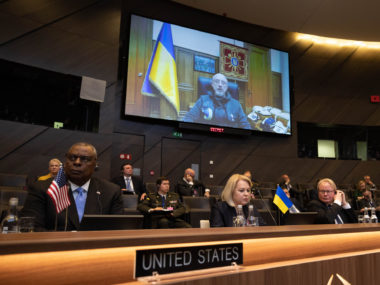By Erica Chenoweth and Oliver Kaplan
[youtube http://www.youtube.com/watch?v=tecohezcA78?rel=0&w=560&h=315]Here are a few thoughts on what was surprising — and what wasn’t — during last night’s presidential debate on foreign policy.
Surprises
- Romney didn’t differentiate himself from Obama. Unlike the previous two debates, Romney openly endorsed a number of Obama’s policies, including sanctions toward Iran, the intervention in Libya, troop draw-downs in Afghanistan, drone strikes, rooting out Al Qaeda’s top leadership, and support for pro-democracy movements in the Middle East. But despite some vacuous statements that the US should be “helping the Muslim world reject violent extremism” and “leading” abroad, he did not offer clear and compelling alternatives to the Obama administration’s policies.
- Obama cast China as more adversarial than Romney did. While Obama described China as an adversary that could be a “potential partner” if they “play by the rules,” Romney took a more conciliatory tone. Here’s hoping that Beijing knows that campaign talk is just campaign talk.
- Romney wants to indict Ahmedinejad. Romney called for the US to indict Ahmedinejad under the Genocide Convention for his denial of the Holocaust and calls for the elimination of Israel. It may perhaps come as a surprise that this will actually be pretty difficult for the US to do. Although the US ratified the convention in 1988, it did so with reservations so that US officials could not be charged with such crimes. Since the convention requires reciprocity, the US actually can’t bring charges against would-be genocidaires, and indeed failed to do so against Saddam Hussein and other past instigators of crimes against humanity. Romney said nothing about removing the reservations or completing ratification of the Rome Statute to make the US a party to the International Criminal Court (ICC). So, for the moment, Romney’s assertion does not seem particularly feasible.
- Obama brought up Yad Vashem. Yad Vashem is not a Holocaust memorial to be invoked lightly — and it wasn’t. Romney attacked Obama for bypassing Israel on his trip to repair relations with the Arab world. Obama effectively shut down that critique by dropping the proverbial Holocaust memorial-bomb. He noted that during his first trip to Israel, as a candidate in 2008, he didn’t bring donors on his plane and instead went straight to Yad Vashem, the Holocaust memorial in Jerusalem, as he said, “to remind myself of the nature of evil”. It seemed an especially effective response to Romney’s frequent charge of Obama’s leaving “daylight” between the US and Israel. It’s an open question as to what sway this will have with Israel-philes, but it was certainly an attempted strong signal to a key constituency.
- Romney didn’t harp on Benghazi or the Iran nuclear talks confusion. Maybe he viewed these as unproductive lines of attack, given that Obama might have some new (and non-falsifiable) information that would make any further Romney criticisms look out of touch.
- Fans of IR signaling theory had a good night. Obama says Romney is muddled. Romney says Obama sends signs of weakness. Killing Bin Laden signals our resolve. Romney’s prevarication on timelines to withdraw from Afghanistan sends mixed messages to troops and allies. Obama hasn’t been clear enough that an Iranian nuclear program is not acceptable to us. The pivot to Asia is sending a signal… Have we made ourselves clear?
- Obama came away with a clear win. By most accounts, viewers thought Obama came away with a decisive victory. Given the past several weeks of bad news coming out of the Middle East, it’s a little surprising that Romney couldn’t articulate more compelling criticisms than he did.
- Bonus surprise: Giants win!!! The San Francisco Giants won the National League Championship Series (NLCS) to get to the World Series last night in San Francisco the pouring rain. Facing elimination, they came back by winning three games in a row (for the second playoff series in a row). Like most SF natives, Oliver was simulcasting the debate and the Giants game…after all, who cares about Obama and Romney anyway?!?!
Non-Surprises
- Rejecting extremism. Both candidates repeatedly emphasized our need to reject extremism, especially in the Muslim world. This is a continuing and enduring theme of our post 9/11-world, and seems like the next iteration of our Middle East policy now that our wars in Iraq and Afghanistan are winding down. However, for the moment, both candidates were vague about how to go about doing this. Indeed, there appear to be inherent contradictions (or at least confusion), as when Romney said that we need “to get the Muslim world to be able to reject extremism on its own”. Just how do we get the Muslim world to do that, on its own?
- Both candidates emphasized the importance of empowering women in improving our national security. Women’s rights and participation was mentioned six times. Bringing up a key constituency was no accident.
- Romney kept trying to pivot to the economy. Perhaps realizing that he couldn’t muster any convincing challenges on the foreign policy front, Romney just tried to change the subject. This was made easier for him by fact that the Chairman of the Joint Chiefs of Staff has repeatedly stated that the United States’ debt is a national security issue (others disagree). Obama did it a few times too, resulting in Bob Schieffer’s mildly irritated response: “Let me get back to foreign policy.”
- Romney tried to cast Obama as weak. This attempt, however, was thwarted by Obama’s performance, which did not make him look weak. On the contrary, regardless of whether his policies are viewed as weak abroad, he came off in the debate looking rather aggressive and more hawkish than Romney.
- Neither candidate knows what to do differently in Syria. Romney did say that he would arm the rebels, but only after “American leadership” had succeeded in building a strong Syrian opposition. That’s exactly what current non-lethal aid is meant to accomplish. That neither candidate has any bright ideas is unsurprising. Syria is a mess.
- Obama brought up bin Laden in his first response. Just in case anyone forgot, the president made sure to remind us that bin Laden was killed under his watch, and that al Qaeda’s core has been “decimated.” That’s sort of true, but it’s also true that al Qaeda is re-grouping and gaining ground in some other key areas.
Although a number of outlets claim a clear Obama victory at the debate, it’s unclear how much this will matter at the polls. Many Americans may be reassured that their president can indeed act presidential, but substantive foreign policy matters usually don’t influence their votes. Nate Silver expects a small bounce for Obama, but this is probably an “enthusiasm” bounce more than a substantive one. Less than two weeks to go.







0 comments
I like this. One curious thing: Why no mention of the military budget, Romney’s wanting more ships and Obama’s zinging lecture on anachronistic thinking: bayonets and horses? Or that Romney regards Iran as our most pressing foreign policy matter while the President sees terrorism as more pressing?
I think the reason Romney was muted in the debate was given the momentum in the race he had a simpler goal – could an undecided voter see him as President and not be concerned that he’s going to do something crazy. He didn’t need to “win” the debate so I think he accomplished that regardless of the substance.
I agree. Romney wins by focusing the election on the economy; because most voters don’t care about foreign policy at all, in this debate he only had to demonstrate he wasn’t a neoconservative. Since Obama’s foreign policy is fairly to the right as it is, the easiest way to do that was mirroring every Obama administration policy position, only saying he’d pursue them with more “resolve”, whatever that means.